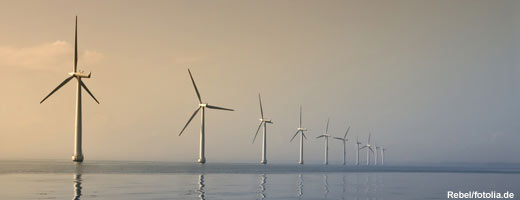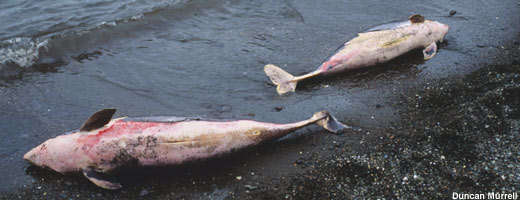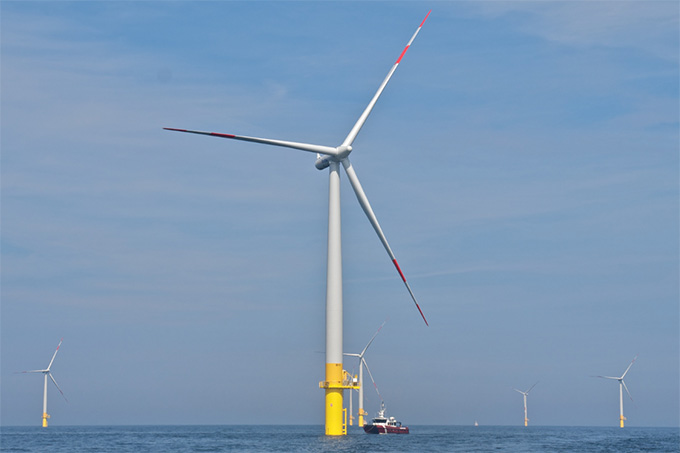The pile-driving process for offshore wind farm construction creates an infernal noise.
Noise threatens our oceans
Expansion of wind farms causes hearing damage to whales and dolphins
March 23, 2010 - Expanding renewable energy is a ground-breaking and effective method to minimize the adverse effects of climate change. Offshore wind power, in particular, offers a huge potential to generate clean energy. However, the envisaged massive expansion of wind farms in our oceans is already causing severe environmental conflicts. Oceans already face a range of adverse impacts from human activities that threaten marine wildlife and the marine environment: overfishing, nutrient pollution (eutrophication) in the oceans, harmful industrial pollutants or marine litter. In addition, a variety of industrial activities such as commercial shipping, sand and gravel extraction, oil and natural gas drilling and, in recent years, the installation of wind farms, all contribute further to the pressures oceans already face.
Germany‘s targets to counteract climate change are ambitious. By 2020 it is expected that at least 30 percent of its energy requirements will be covered by renewable energy, approximately half of which will come from wind power. While more than 20,000 wind turbines already generate electricity inland, the offshore sector is still in its infancy and faces great technological challenges. Germany‘s first wind farm “alpha ventus”, located 40 km north of Borkum, went into operation at the end of 2009. But Germany has set high targets for expansion. The Federal Maritime and Hydrographic Agency (BSH), responsible for granting permission to erect wind farms in the German Exclusive Economic Zone (EEZ) has approved 26 projects in the North Sea and Baltic Sea, with nearly 70 applications for wind farms awaiting approval.
-

-

Stranded on the beach. Underwater noise causes whales to lose orientation
Conservationists are mostly concerned about inadequate spatial planning, i.e. coordinating interests and uses of the oceans, but the commonly used technique to install the foundations of wind turbines is also a serious concern. The common practice today is the pile-driving process. Hydraulic hammers strike the foundation piles thousands of times in order to drive them into the sea bottom. This causes an infernal noise with sound pressures higher than 200 decibels. 110 decibels, at the top of the decibel scale, is considered harmful to humans. It is also the upper limit at discotheques. A truck passing by causes sound pressures between 80 and 100 decibels. A jet reaches 120-140 decibels at take-off.
Nearly all marine animals use some form of sound. Whales and dolphins rely primarily on their sense of hearing. Toothed Whales are specialists in echolocation. In other words, they have the same capability bats have and use this tool to create an acoustic image of their surroundings. The Toothed Whales, our native harbour porpoise also belongs to this family and uses sound waves not only for navigation but also for communication as well as attracting mates and when preying. Recent reports by German scientists show that porpoises hearing can be damaged at sound exposure levels (SEL) of 160 decibels. Behavioural changes have been documented at much lower levels.
There are, to be sure, methods to reduce noise and minimize the harmful effects. They are, however, undergoing development and still in the testing phase. Consequently, these techniques are not compulsory upcoming projects. Researchers are mainly interested in reducing noise at its source and are investigating various possibilities. These options include alternative construction techniques, gravity foundations or drilling techniques.
The „air bubble curtain“, is currently the most advanced form of technology. A high-volume air compressor feeds air into perforated air hoses or tubes installed on the sea floor. The rising bubble curtain acts as a wall holding back the noise and dampening it. Underwater sound pressure levels are reduced between 12-14 decibels. Therefore, it is up to contractors and government agencies now to develop emerging technologies and require that they be applied at all future sites for wind farms. If offshore wind power is to be the green source of energy in the future, this is the only course of action that will guarantee its success.
In preparation of the 2011 annual conference of the European Cetacean Society, the Federal Maritime and Hydrographic Agency organized a workshop that took place in Stralsund, Germany on March 21, 2010. The main topic was the status-quo of offshore wind power. Nature conservation organizations used this venue to voice their positions on offshore wind power in the North Sea and Baltic Sea.

